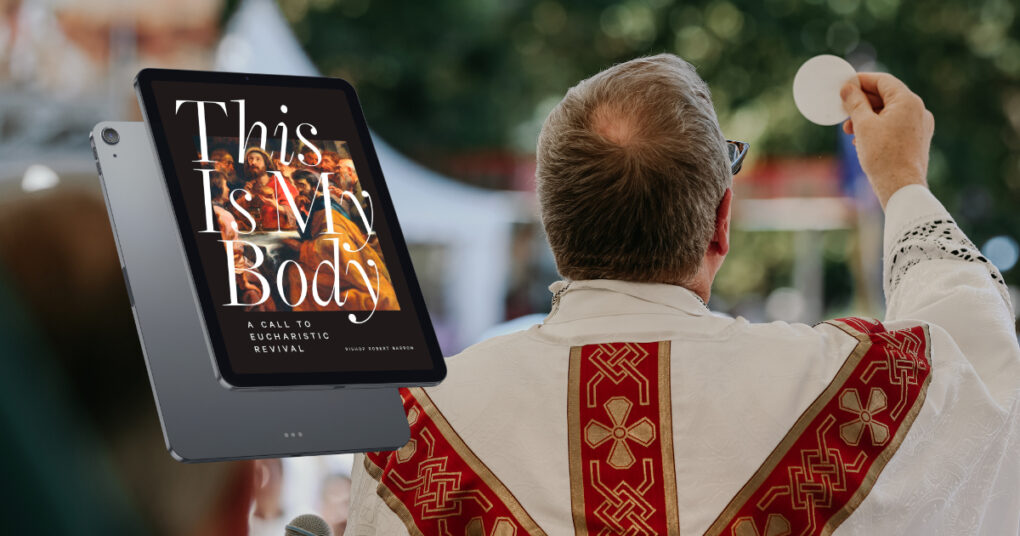This is my Body: A Call to Eucharistic Renewal
Bishop Robert Barron
Word on Fire
April 2023
100 pages
ISBN: 978 1685789978
“Sacred Meal”, “Eucharist as Sacrifice,” “If it’s a Symbol, to Hell with it.” These are the three chapters in Bishop Barron’s short volume This is My Body, which he has written to accompany the Eucharistic Revival now under way in the United States, responding to the Pew Forum Survey which stated that only one third of the Catholics questioned subscribed to the Church’s official teaching that Jesus is really, truly, and substantially present under the signs or appearances of bread and wine. Barron brought this finding to his fellow American bishops: “Brothers, we have a problem.” Hence the Eucharistic Revival.
Chapter One deals with the Eucharist as Sacred Meal. Far from a cosy get-together, for Barron, the sacred meal is a symbol of the entire theology of creation, of the Garden of Paradise; it is a sacred banquet at which the Creator shares his life with his grateful creatures. The Passover meal was the recovery of that fellowship, and Isaiah goes further, speaking of the mountain where God will make for all peoples a feast of rich food. Jesus’ own life begins in a manger, where animals eat, he is food for a hungry world and he asks the disciples to distribute loaves to the people, showing that when we give the gift away, it is not lost but enhanced. All of this comes to a head at the Last Supper, the true Passover, when Jesus makes a gift of his own body and blood, given and shed for us to heal the world and make it ready to sit down with God. This is reflected by the Lake of Galilee, when after a barren night’s fishing by the apostles, Jesus himself provides the materials and hosts their breakfast. Ultimately God invites us to sit, first at the liturgy, where all are welcome, and then at the banquet of eternity.
This is not a cheap grace, as Chapter Two on the Eucharist as Sacrifice points out. We have been bought at a price. We may not separate the meal and sacrifice dimensions of the Eucharist. The destroying power of human sin required a conversion, a turning back to God, which we can trace right through the Old Testament. All the covenants required a sacrifice: Noah, Abraham, Moses.… But there was also a sacrificial figure who was to come, a “suffering servant”, the very Lamb of God who would take away our sins, heal us by his own wounds. The sacrifice of the Mass is a participation in this great eternal act by which Jesus entered on our behalf into the heavenly sanctuary with his own blood and returned bearing the forgiveness of the Father. Only in the measure that we are transformed through sacrifice, only when our sin and suffering have been dealt with, can we sit down in the fellowship of the sacred banquet.
“If it’s a symbol, to hell with it.” Always a Flannery O’Connor fan, Barron starts chapter three, on the Real Presence, with O’Connor’s now-famous nervy remark at a literary dinner, when Mary McCarthy, a former Catholic, condescendingly stated that the Eucharist was, as symbols go, “a pretty good one”. Barron starts from here to deal with the “hard doctrine” of Jesus’ “bread of life” discourse when many “no longer walked with him”. He shows that this was no metaphor and then gives a deft summary of Catholic teaching on the Eucharist through the ages: the earliest Fathers, the Middle Ages, with special emphasis on St Thomas’s doctrine of the Eucharist, the use of the term “transubstantiation”, and the later Protestant revolt. Finally, he reviews some contemporary approaches to the Real Presence, highlighting theologies which stress the creative power of the divine word at work in the Blessed Eucharist. He concludes with a “health warning”: if the Eucharist was merely a symbol, it would pose no threat, but since it is the power and presence of God, it will transform us who consume it.
This short book, available electronically too, is full of biblical and theological insights into the Blessed Sacrament which will enrich the reader.
About the Author: Patrick Gorevan
Rev. Patrick Gorevan is a priest of the Opus Dei Prelature. He lectures in philosophy in St Patrick’s College Maynooth and is academic tutor at Maryvale Institute. He has written on the early phenomenological movement, virtue ethics and the role of emotion in moral action.

